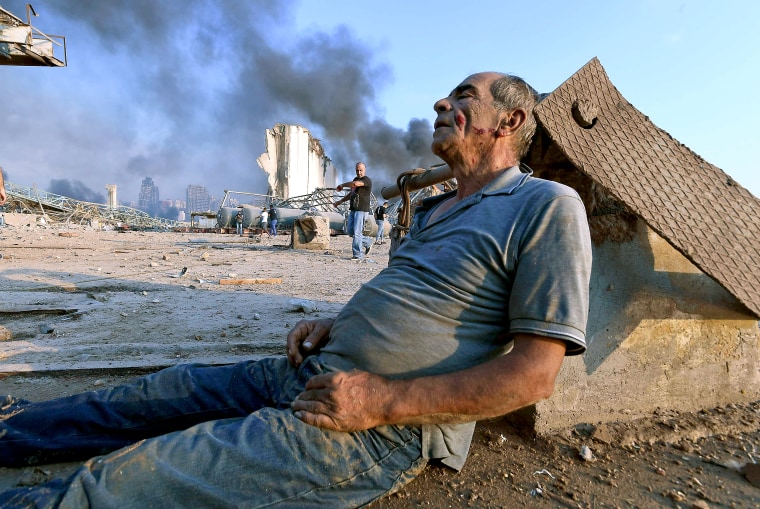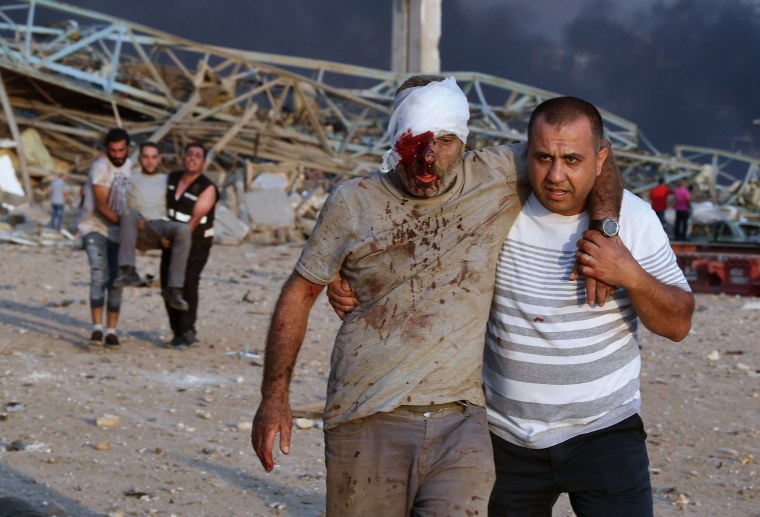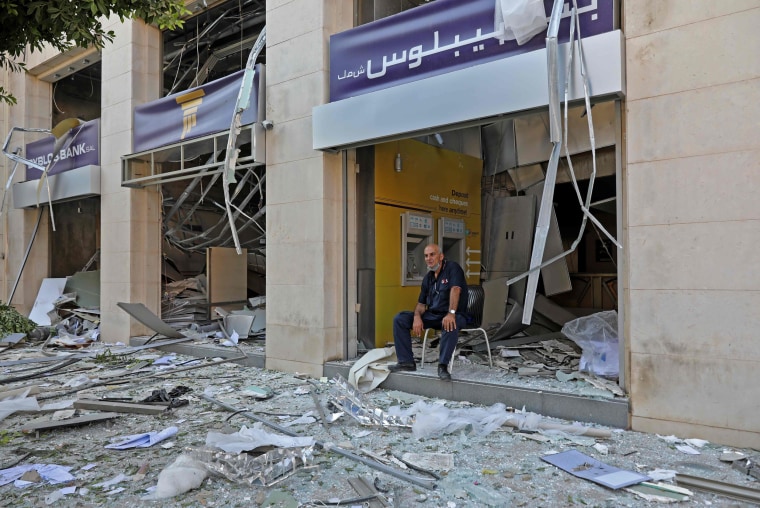BEIRUT — It seemed like all hope was lost.
But after 15 hours buried under the rubble of his home in Beirut, Imad Atar was miraculously pulled out alive by a civil defense team Wednesday, punching the air weakly with joy as crowds clapped, cried and cheered in an emotional display.
Drenched in sweat from the August sun, the team of volunteers used pickaxes and shovels to dig Atar out from under the rubble of his home in the Geitawi neighborhood, in the east of the Lebanese capital.
A roar of joy reverberated through the streets as the volunteers screamed "he's alive!" and pulled him out along with items from his former home — a pair of slippers, children's toys and jewelry.
The rescue team lifted Atar onto a stretcher and into a nearby Red Cross ambulance amid cheers — a brief moment of joy in a city in mourning.
Atar is one of the survivors of an explosion that rocked Beirut on Tuesday, killing at least 100 people and injuring thousands more, according to the Lebanese Red Cross.
Although the exact trigger of the blast remains unclear, tons of ammonium nitrate stored at a warehouse at the Beirut port have been blamed, Lebanese Prime Minister Hassan Diab said, promising a full investigation.

As day broke in Beirut, residents woke up to near-apocalyptic scenes as the city was shrouded in smoke and dust.
Whole apartment facades had fallen, windows were blown out and furniture was strewn in the streets of many neighborhoods. Hundreds of dazed and blood-soaked residents — many of them used to catastrophe, having lived through decades of civil war — fled to the nearby mountains for safety Tuesday night.
Overwhelmed hospitals turned people away as scores of people nursed injuries from the blast, which was heard as far away as Cyprus.
Many Beirutis expressed anger and sadness as they tried to digest the shock.
"Our shop is destroyed. Our home is destroyed. Our life is destroyed. Why are we stuck in this country?" asked wedding store owner Mohamed Abidis, dejected and distraught.
"Even in the civil war we didn't see anything like this. Not in this neighborhood," he said in an interview, referring to the conflict that tore the country apart from 1975 to 1990.
Some pointed the finger at Lebanon's beleaguered government as the extent of the destruction came to light.
"I'd almost rather this be an act of terrorism rather than an act of negligence," said a Beirut bar owner who spoke on condition of anonymity for fear of persecution. "At least in that sense there would be somebody else to blame, for once."
Others took a practical approach. Volunteers flocked to downtown Beirut — just a day before, the trendy heart of the capital — to sweep up debris and give out food and water in the heat.

Images and videos were feverishly being circulated on social media, with #PrayforLebanon trending Wednesday, along with international outpourings of solidarity and grief. The front pages of Lebanese newspapers depicted striking scenes of chaos and destruction.
Download the NBC News app for the latest on the Beirut explosion
"It really sounded like thunder. Then there was an enormous bang, and I was blown backwards from the doorway. ... Our door was ripped off its hinges," said Lizzie Porter, a journalist living in Beirut, who initially mistook the blast for an earthquake.
"People here, unfortunately, are now used to this kind of very traumatic experience," she said.
Lebanon is struggling with an unprecedented economic crisis in which its currency has lost 80 percent of its value and unemployment has spiraled, with fed-up residents frequently taking to the streets in protests.
"It's mayhem here, honestly. I used to live in New York, and I was in Manhattan on 9/11, and it's the same there today — it's the same feeling, the same smell," said Hassan Sinno, 42, a construction company manager.

The governor of Beirut, Marwan Abboud, said Wednesday that the cost of the damage to the capital, already under economic pressure, could be $3 billion to $5 billion, adding that the explosion had made at least 200,000 people homeless.
Offers of international aid from France to the United States and Middle East have poured in for the tiny country, but more needs to be done, said Samah Hadid, head of advocacy at the Norwegian Refugee Council, a nongovernmental organization, who witnessed the blast.
"Lebanon really needs support. Lebanese communities were already facing poverty, starvation and an economic crisis, as well as the COVID pandemic — now this explosion adds so much more misery and suffering," Hadid said.
"The country is brought to its knees and can't cope with this catastrophe alone."

